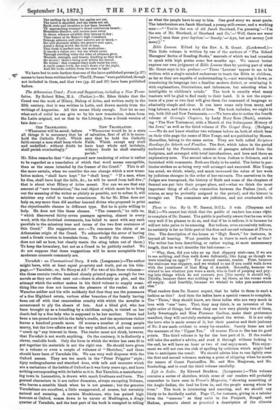Yarndale : an Unsensgtional Story. 8 vols. (Longmans.) — The author might
have, with at least equal propriety and truth, put on his title- page,—" Yarndale ; or, No Storyat All." For two of his three volumes— the three contain twelve hundred closely printed pages, enough for two novels as they are often sent out—there is absolutely no plot, and the attempt which the author makes in his third volume to supply some- thing like one does not increase the pleasure of the reader. Au old Waterloo soldier and his wife suddenly find that they are the possessors of a fine Highland estate, various elder branches of the family having been cut off with that remorseless cruelty with which the novelist is accustomed to ply the shears of fate. And a blind girl, who has been brought up as a foundling by a childless couple, is visited on her death-bed by a fine lady who is supposed to be her mother. There had been a ten-pound note left in the baby's cradle, and the mysterious visitor leaves a hundred pounds more. Of course a number of young people marry, but the love-affairs are of the very mildest sort, and one cannot 4' coach up" any interest in them. The reader must not think, however, that Yarndale is not worth anything. On the contrary, it is distinctly a clever, readable book. Only the form in which the writer has seen fit to put together his materials is not the right one. He should have given as a volume or even a couple of volumes of "Sketches," and these should have been of Yarndale life. We can very well dispense with the Oxford scenes. They are too much in the "Peter Priggina" style ; tipsy undergraduates and starched dons, with talk and manners which are a caricature of the habits of Oxford as it was forty years ago, and have nothing corresponding with its habits as it is. But Yarndale, a manufactur- ing town in Lancashire, is drawn with much liveliness and force. The genteel characters in it are rather dummies, always excepting Dolman, who leaves a sensible blank when he is not present ; but the genuine Yarndalians are excellent, a little exaggerated, of course, but certainly natural and amusing. A certain Monkhouse, who has gained high honours at Oxford, comes down to be curate at Macilington, a dingy quarter of Yarndale, and the beat part of the book is occupied in telling
us what the people have to say to him. One good story we must quote. The interlocutors are Jacob Shorland, a young mill-owner, and a working man :—" You're the son of old Jacob Shorland, I'm guessing.'—'I'm the son of Mr. Shorland, of Shorland and Co.'—' Well, there are wanr [worse] men than your fayther.'—' Surely.'—'Aye, but not monny [not many].'"


































 Previous page
Previous page